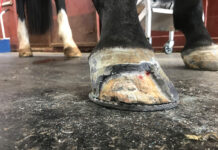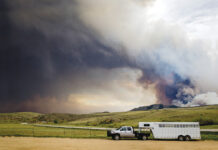
Horse owners have the opportunity to vaccinate their horses against a whole variety of infectious diseases. Unfortunately, they’re also confronted with a whole variety of advice from a whole variety of sources—and most of them sound at least somewhat persuasive.
What’s a horse owner to do? In the interest of trying to bring at least a little bit of clarity to what can be some very muddy waters, let’s talk a little bit about vaccination options for your horse.
Core Vaccinations
“Core vaccinations” is a term that the American Veterinary Medical Association came up with to describe vaccinations “that protect from diseases that are endemic to a region, those with potential public health significance, required by law, virulent/highly infectious, and/or those posing a risk of severe disease. Core vaccines have clearly demonstrated efficacy and safety, and thus exhibit a high enough level of patient benefit and low enough level of risk to justify their use in the majority of patients.”
The American Association of Equine Practitioners (AAEP) considers the core vaccinations for horses to be Eastern and Western encephalomyelitis (EEE and WEE), rabies, tetanus, and West Nile virus.
If you look a little deeper, the definition highlights some important considerations for any horse owner. So let’s break that down a bit, and see what we come up with.
1. “Endemic to a Region”
If you live in San Francisco, Calif., or the Bronx, N.Y., I’d think that you’re much more likely to run into a good, authentic Italian restaurant than if you live, say, in Jasper, Ind. That’s not to say that there’s zero possibility of a really good marinara sauce in a small town in Indiana, just that it’s more likely to find one where there’s a higher concentration of Italian chefs.
Diseases are like that, too.
For example, if you live in Florida, there are lots more mosquitoes than in Arizona. You’ll find many more rabid animals in Michigan than you will in Southern California.
As such, if you’re living in Charleston, S.C., it makes a lot of sense to vaccinate often against mosquito-borne diseases such as viral encephalitis (especially Eastern and Western), but it’s probably much less important if you’re living in the middle of the Mojave Desert. Your veterinarian should be a good source of information about which diseases are prevalent in your area.
2. “Potential Public Health Significance”
By and large, there are not a whole bunch of communicable diseases that you can get from your horse. One big one, of course, is rabies.
Rabies is a really bad disease for which there is no cure. Fortunately, the vaccines that are available to prevent rabies are very effective. If you live in an endemic area (see above), you should vaccinate your horse against it.
3. “Required by Law”
Even if you don’t agree with the law, the people who make laws get rather upset when other people break them, and they can make life fairly miserable for scofflaws. So, in addition to there being a public health reason to vaccinate against rabies, it’s also the law in some states.
4. “Virulent/Highly Infectious”
A disease that is both virulent and highly infectious is about as bad as a disease can be. Virulent means that it’s really harmful, and “highly infectious” means that it’s easy to transmit between horses. I’m pretty sure most owners would agree that it’d be great to prevent such things.
5. “Posing a Risk of Severe Disease”
Although I’m sure you wouldn’t want your horse to get any disease, my guess is that if he’s going to get one, you’d rather him get one that doesn’t make him too sick for too long.
As such, it’s a good idea to prevent diseases such as rabies, tetanus and encephalitis because if your horse gets one of those, his disease is essentially a death sentence. West Nile virus, while its virulence has decreased since horses in the United States were first exposed in 1999, can still make horses pretty sick, and if you’re in an endemic area, or thinking about traveling to an area where the disease is endemic, it’s a really good idea to get your horse covered.
6. “Efficacy and Safety”
For many equine diseases, it’s hard to know what to say about how well the vaccines work (efficacy). And while most are pretty safe, none of them are 100 percent free of side effects.
While we can say with a reasonable amount of confidence that most equine vaccines are pretty safe (they test for that before they release the vaccine), it’s much harder to say that all of them are equally effective at preventing disease.
7. Risk/Benefit
Unless you’re vaccinating because you have to, it’s the risk/benefit analysis of vaccinations that is probably the most important consideration when it comes to making a decision about which vaccines to give to your horse.
The person who is likely to be most knowledgeable about which vaccines are needed for your horse in his particular circumstances is your veterinarian.
Medicine changes, and so will vaccination recommendations. It’s important to stay abreast of current developments for the good of your horse.
Further Reading:
Can I Vaccinate My Own Horse?
Field Guide to Equine Vaccines
David Ramey, DVM, is an equine veterinarian based in Los Angeles, Calif. He is also a researcher, author, lecturer, and blogger. Clinical practice: www.rameyequine.com; blog: www.doctorramey.com
This article originally appeared in the April 2017 issue of Horse Illustrated magazine. Click here to subscribe!





